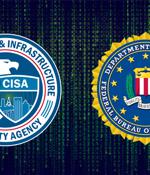Security News

Cybersecurity agencies from Australia, the U.K., and the U.S. on Wednesday released a joint advisory warning of active exploitation of Fortinet and Microsoft Exchange ProxyShell vulnerabilities by Iranian state-sponsored actors to gain initial access to vulnerable systems for follow-on activities, including data exfiltration and ransomware. The threat actor is believed to have leveraged multiple Fortinet FortiOS vulnerabilities dating back to March 2021 as well as a remote code execution flaw affecting Microsoft Exchange Servers since at least October 2021, according to the U.S. Cybersecurity and Infrastructure Security Agency, the Federal Bureau of Investigation, the Australian Cyber Security Centre, and the U.K.'s National Cyber Security Centre.

The Iranian APT has been exploiting Fortinet vulnerabilities since at least March 2021 and a Microsoft Exchange ProxyShell vulnerability since at least October 2021, according to the alert. In keeping with what CISA described on Wednesday, MSTIC has seen the Iran-linked Phosphorous group - aka a number of names, including Charming Kitten, TA453, APT35, Ajax Security Team, NewsBeef and Newscaster - globally target the Exchange and Fortinet flaws "With the intent of deploying ransomware on vulnerable networks."

"FBI and CISA have observed this Iranian government-sponsored APT group exploit Fortinet vulnerabilities since at least March 2021 and a Microsoft Exchange ProxyShell vulnerability since at least October 2021 to gain initial access to systems in advance of follow-on operations, which include deploying ransomware," CISA said. The Iranian state hackers focus their attacks on US critical infrastructure sectors and Australian organizations.

On Wednesday, BleepingComputer reported that it's been in touch with a threat actor who leaked a list of nearly half a million Fortinet VPN credentials, allegedly scraped from exploitable devices last summer. The news outlet has analyzed the file and reported that it contains VPN credentials for 498,908 users over 12,856 devices.

Network security solutions provider Fortinet confirmed that a malicious actor had unauthorizedly disclosed VPN login names and passwords associated with 87,000 FortiGate SSL-VPN devices. "These credentials were obtained from systems that remained unpatched against CVE-2018-13379 at the time of the actor's scan. While they may have since been patched, if the passwords were not reset, they remain vulnerable," the company said in a statement on Wednesday.

A threat actor has leaked a list of almost 500,000 Fortinet VPN login names and passwords that were allegedly scraped from exploitable devices last summer.While the threat actor states that the exploited Fortinet vulnerability has since been patched, they claim that many VPN credentials are still valid.

Details have emerged about a new unpatched security vulnerability in Fortinet's web application firewall appliances that could be abused by a remote, authenticated attacker to execute malicious commands on the system. "An OS command injection vulnerability in FortiWeb's management interface can allow a remote, authenticated attacker to execute arbitrary commands on the system, via the SAML server configuration page," cybersecurity firm Rapid7 said in an advisory published Tuesday.

A command injection vulnerability exists in Fortinet's management interface for its FortiWeb web app firewall, according to infosec firm Rapid7. An authenticated attacker can use the vuln to execute commands as root on the Fortiweb device, Rapid7 said in a blog post.

The OS command-injection bug, in the web application firewall platform known as FortiWeb, will get a patch at the end of the month. An unpatched OS command-injection security vulnerability has been disclosed in Fortinet's web application firewall platform, known as FortiWeb.

Researchers have discovered a vulnerability in Fortinet's FortiWeb web application firewall, and while it has been classified as high severity, the actual risk of exploitation in the wild seems low. Tod Beardsley, director of research at Rapid7, told SecurityWeek that they have not seen any information from Fortinet regarding a patch, but they do expect the vulnerability to be fixed soon.